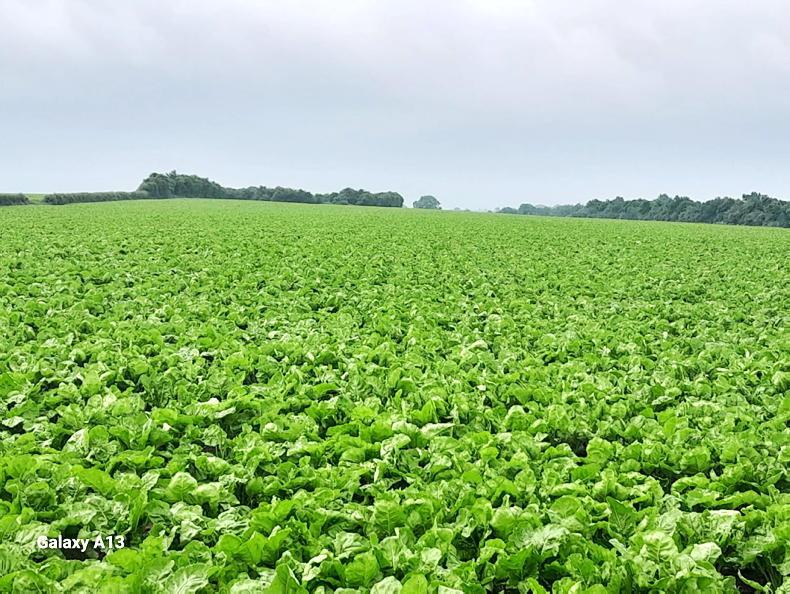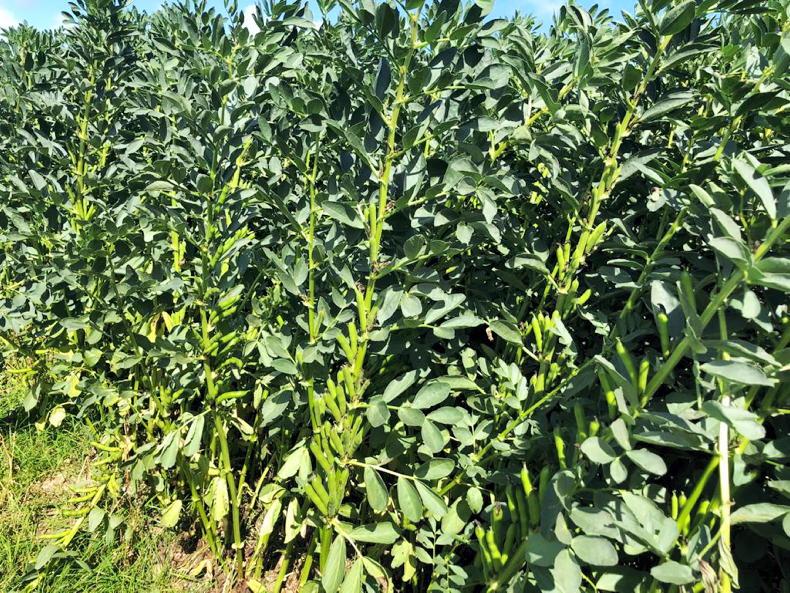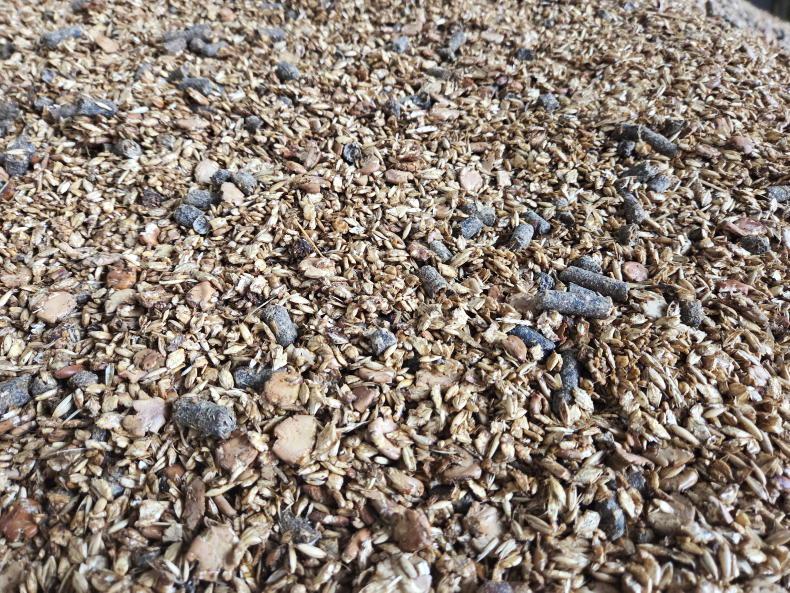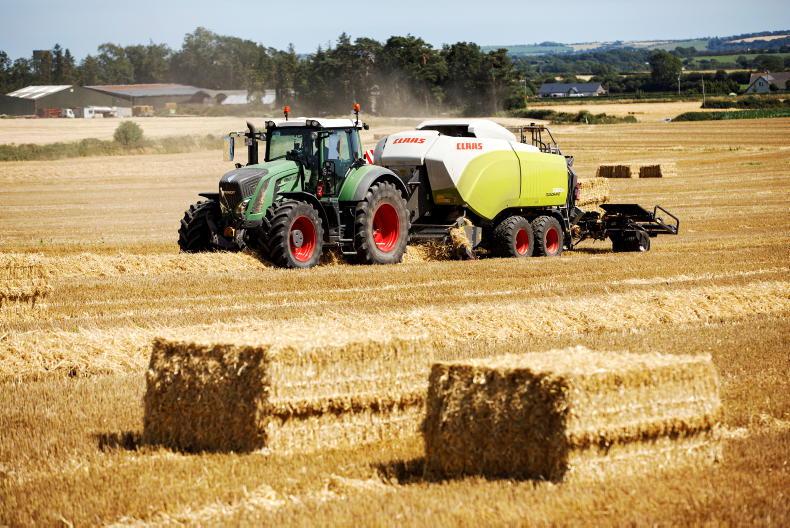Rain over the past two weeks has been a welcome sight for Jack as his crops had been under water stress for some time when the weather broke.
Crops have now recovered somewhat and he hopes that they can fill their grains well over the next few weeks.
Jack says that not everything has gone to plan with his organic spring wheat and oats.
When last speaking to Jack, he had planned to weed his crops again. However, the lack of moisture in the soil and the stress that the crops were already under prevented this. This means that there are still some weeds in the crops, especially charlock in the oats. The dry weather also caused the wheat and oats to shoot out very early, leaving the crops quite short.
Despite this, Jack says that they have not yellowed at all, retaining a nice green colour and they look like quite healthy plants overall. Jack puts this down to the compost and soiled water (which is run-off from the compost) that was applied over the winter months.
Jack makes this compost with straw, horse manure and whatever else he can source easily. It is turned every couple of months and then applied to the land.

Jack's organic spring wheat still has some weeds for company.
The multispecies sward has a great bulk to it. The chicory in it is over 1.5 metres tall and is flowering. Jack is unsure what the quality of the hay he intends to make will be but the large roots have been great for the soil.
Fruit is now forming on the agroforestry trees. Jack says there is a decent crop considering the trees are only in their second year. He was slightly worried about them during the dry weather but they coped well.
Jack is hosting a farm walk on his farm this Saturday 1 July in association with the Irish Organic Association. Prior booking is essential and details can be found on irishorganicassociation.ie.
There has been 25mm of rain in the past week in Tipperary. Mark says that his area was not as badly affected by a lack of moisture as they have had heavy showers for the past few weeks.
Despite heavy rain, all his crops are still standing except for a couple of small fertiliser overlaps in the winter barley.
Mark expects to begin harvesting in 10 to 14 days. The winter barley looks very good and the grains are well-filled.
The winter wheat is still very clean on the upper leaves. In fact, Mark says that all of his crops are spotless, which was helped by the dry weather.
The winter wheat received a T3 fungicide a couple of weeks ago. Pecari Extra (1l/ha) was applied. Mark is very happy with the crop at this stage, and the grains are filling nicely.
The rain came just in time for the spring beans, which were starting to stress.
They are showing no signs of stress now though as there are plenty of pods and they appear to be well-filled.
The spring barley and oats have both received their final fungicides. The early-sown spring barley looks very good, and while the later-sown barley is thinner, it still looks OK compared to many crops around the country.
The T2 spray on the barley consisted of Innox Pro (0.4l/ha), Priaxor EC (0.8l/ha) and Arizona (1.25l/ha).

Mark's fodder beet has met between the rows and is growing strongly.
The spring oats got Globaztar SC (0.5l/ha), Kavatur Plus (0.5l/ha), and NTS Trio (CMB) (1l/ha), a mix of calcium, magnesium, and boron.
Mark finished up the herbicides on his fodder beet last week. Bortrac 150 (3l/ha), Target SC (1l/ha), Oblix 500 (0.5l/ha), Beetup Flo (2l/ha), and Toil (1l/ha) were applied. The beet looks well and is growing strongly. The maize is knee-high already and loved all the sunshine over the past month.
Mark applied Calaris (1.25l/ha) to control weeds.
The sporadic nature of the heavy showers over the past couple of weeks has not favoured Tony. His farm had only received 6mm to 8mm of rain between 10 May and last weekend, when the first meaningful rain fell.
While the winter wheat and beans still look very good, some maize has struggled, especially fields that were planted into wet ground, which then hardened very quickly and led to poor establishment. Fields that got some light rain are at the five- to six-leaf stage, while other fields, especially those by the coast, are just germinating, or have germinated and look very poor.
These crops battled two weeks of harsh easterly winds which stressed the crop and dried out the ground.
Tony has been spraying his maize for weeds over the past week with Elumis at 1.25l/ha.
He also included Delfan Plus, a foliar feed product, to reduce stress on the crops.
The gate has been closed on the winter wheat. At flowering, Tony applied a mix of Proline (0.75l/ha), Optiplant (1.25l/ha), amino acids (1l/ha), and Final K (4l/ha). The crop is phenomenal, according to Tony, especially considering the low amount of chemicals that have been applied to the crop. There is very little disease and it is very green. He hopes that the crop can live up to its potential at harvest time.
The spring beans are also spotless. While there are some areas where there was poor or no establishment, Tony notes that he has never had beans that look so healthy. The crop has received no chemical fungicide at all.
For the second and final spray, Tony applied a mixture of phosphite (1l/ha), Pulsar (4l/ha), Optiplant (1l/ha), and amino acids (1l/ha). As can be seen in the photo on the left, the crop has had excellent pod formation and they are filling quite well.
Tony’s heavy clay soils helped the beans to cope well with the dry weather.
Rain over the past two weeks has been a welcome sight for Jack as his crops had been under water stress for some time when the weather broke.
Crops have now recovered somewhat and he hopes that they can fill their grains well over the next few weeks.
Jack says that not everything has gone to plan with his organic spring wheat and oats.
When last speaking to Jack, he had planned to weed his crops again. However, the lack of moisture in the soil and the stress that the crops were already under prevented this. This means that there are still some weeds in the crops, especially charlock in the oats. The dry weather also caused the wheat and oats to shoot out very early, leaving the crops quite short.
Despite this, Jack says that they have not yellowed at all, retaining a nice green colour and they look like quite healthy plants overall. Jack puts this down to the compost and soiled water (which is run-off from the compost) that was applied over the winter months.
Jack makes this compost with straw, horse manure and whatever else he can source easily. It is turned every couple of months and then applied to the land.

Jack's organic spring wheat still has some weeds for company.
The multispecies sward has a great bulk to it. The chicory in it is over 1.5 metres tall and is flowering. Jack is unsure what the quality of the hay he intends to make will be but the large roots have been great for the soil.
Fruit is now forming on the agroforestry trees. Jack says there is a decent crop considering the trees are only in their second year. He was slightly worried about them during the dry weather but they coped well.
Jack is hosting a farm walk on his farm this Saturday 1 July in association with the Irish Organic Association. Prior booking is essential and details can be found on irishorganicassociation.ie.
There has been 25mm of rain in the past week in Tipperary. Mark says that his area was not as badly affected by a lack of moisture as they have had heavy showers for the past few weeks.
Despite heavy rain, all his crops are still standing except for a couple of small fertiliser overlaps in the winter barley.
Mark expects to begin harvesting in 10 to 14 days. The winter barley looks very good and the grains are well-filled.
The winter wheat is still very clean on the upper leaves. In fact, Mark says that all of his crops are spotless, which was helped by the dry weather.
The winter wheat received a T3 fungicide a couple of weeks ago. Pecari Extra (1l/ha) was applied. Mark is very happy with the crop at this stage, and the grains are filling nicely.
The rain came just in time for the spring beans, which were starting to stress.
They are showing no signs of stress now though as there are plenty of pods and they appear to be well-filled.
The spring barley and oats have both received their final fungicides. The early-sown spring barley looks very good, and while the later-sown barley is thinner, it still looks OK compared to many crops around the country.
The T2 spray on the barley consisted of Innox Pro (0.4l/ha), Priaxor EC (0.8l/ha) and Arizona (1.25l/ha).

Mark's fodder beet has met between the rows and is growing strongly.
The spring oats got Globaztar SC (0.5l/ha), Kavatur Plus (0.5l/ha), and NTS Trio (CMB) (1l/ha), a mix of calcium, magnesium, and boron.
Mark finished up the herbicides on his fodder beet last week. Bortrac 150 (3l/ha), Target SC (1l/ha), Oblix 500 (0.5l/ha), Beetup Flo (2l/ha), and Toil (1l/ha) were applied. The beet looks well and is growing strongly. The maize is knee-high already and loved all the sunshine over the past month.
Mark applied Calaris (1.25l/ha) to control weeds.
The sporadic nature of the heavy showers over the past couple of weeks has not favoured Tony. His farm had only received 6mm to 8mm of rain between 10 May and last weekend, when the first meaningful rain fell.
While the winter wheat and beans still look very good, some maize has struggled, especially fields that were planted into wet ground, which then hardened very quickly and led to poor establishment. Fields that got some light rain are at the five- to six-leaf stage, while other fields, especially those by the coast, are just germinating, or have germinated and look very poor.
These crops battled two weeks of harsh easterly winds which stressed the crop and dried out the ground.
Tony has been spraying his maize for weeds over the past week with Elumis at 1.25l/ha.
He also included Delfan Plus, a foliar feed product, to reduce stress on the crops.
The gate has been closed on the winter wheat. At flowering, Tony applied a mix of Proline (0.75l/ha), Optiplant (1.25l/ha), amino acids (1l/ha), and Final K (4l/ha). The crop is phenomenal, according to Tony, especially considering the low amount of chemicals that have been applied to the crop. There is very little disease and it is very green. He hopes that the crop can live up to its potential at harvest time.
The spring beans are also spotless. While there are some areas where there was poor or no establishment, Tony notes that he has never had beans that look so healthy. The crop has received no chemical fungicide at all.
For the second and final spray, Tony applied a mixture of phosphite (1l/ha), Pulsar (4l/ha), Optiplant (1l/ha), and amino acids (1l/ha). As can be seen in the photo on the left, the crop has had excellent pod formation and they are filling quite well.
Tony’s heavy clay soils helped the beans to cope well with the dry weather.











SHARING OPTIONS